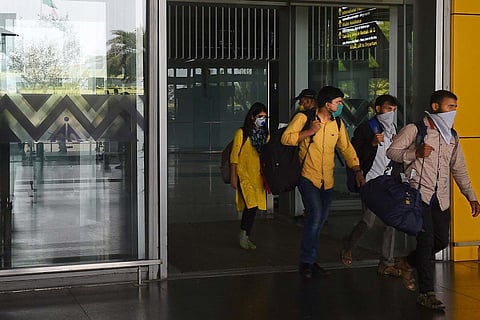

‘Kerala is considered to be highly vulnerable to a crisis like this (the global financial depression of 2008) because of its increased openness to outside world,” aptly concludes a study titled ‘Financial Crisis and Kerala Economy’ by M Parameswaran, an assistant professor at the Centre of Development Studies, Thiruvananthapuram in 2011.
“The growth rate in 2008-09 was well below the growth rate recorded in the previous year,” the study says.
While the financial crisis of 2007–2008 didn't impact the economy of Kerala as badly as it was feared, this time, things could be different. Given the large migrant population from Kerala, across Gulf countries, it is feared that the repercussions of the global economic stagnation, augmented by the COVID-19 pandemic, could be worse on the state economy.
The first time the state witnessed an influx of Gulf returnees was during the time of the Gulf War between August 1990 and February 1991.
“The second time we expected a large influx was during the global crisis in 2008. But even at that time, it didn’t have as much impact as the state feared since only the UAE had been adversely affected by the crisis. It was during the time of the Gulf War that the state witnessed a huge influx from Gulf countries; but it was from one country, Kuwait. But now, in 2020, given the COVID-19 scenario, it could be even worse,” Dr S Irudaya Rajan, an academic who studies migration trends at the Centre for Development Studies, tells TNM.
The fear of a massive lay-off looms large over Non-Resident Keralites (NRKs).
If countries, particularly those under the Gulf Cooperation Council (GCC) lay-off non-native employees, the Kerala economy would be the worst-hit among Indian states.
“Yes, we fear that,” says Benoy Peter of the Centre for Migration and Inclusive Development (CMID).
Economies worldwide are heavily dependent on migrant employees, especially blue-collar workers in the long run.
“In the long run, countries are most likely to open up again for migrant workers. Thus, while the impact on the economy in Kerala would be for a short term, it would be catastrophic,” Benoy asserts.
The annual remittance from NRKs to the state is Rs 1,00,000 crore, which is about 30 percent of Kerala’s economy.
The contribution is largely by those living in the GCC countries. There are around 27 lakh Malayalis living in other countries. Among this, 20 lakh are in GCC countries.
“If the GCC countries together go for lay-offs, remittances to the state will be much lower, which in turn will have an impact on the economy. The government will then need to opt for a rehabilitation package for those who are coming back. The economic impact is, however, yet to be assessed. We have to observe what is happening there. We have to wait and see what the GCC employers would decide, whether they would give salary or not. We are observing the decision. The assessment has begun but we are not yet going for an estimate. This will take a week or a month,” Irudaya Rajan adds.
“Only ten percent of NRKs reside in the United States and Europe. They are mostly permanent residents in those countries, they won’t send any money back to the state and hence, there are no remittances to the state. Therefore, the changes in the US or Europe won’t have repercussions for the state,” says the academic, who is also a member of the Kerala government’s COVID-19 task force.
Benoy Peter, meanwhile, rues the lack of transparency among GCC countries with regard to the trajectory of the disease and its transmission.
“The mortality rate could be high in the Gulf countries, including Keralites there. This would have an impact on Kerala, which is a remittances economy. Not that the remittances won’t be coming, but the expenditure of those who send the money would have increased for some of them who may have been infected with the disease. Their unforeseen expenditure would impact remittances. My observation is that this would have a catastrophic impact on Kerala,” he says.
The investment of most of the NRKs is not an adaptive one, he continues.
“So while the expenditure increases, they would be short of liquid money for which they need to liquidate vehicles or other assets. This investment pattern of the NRKs hasn’t changed despite the other crises they have faced. Our aim is to get maximum people back to their livelihood. People being out of work leads to a cycle of no income, no expenditure and no cash flow in the economy,” he says.